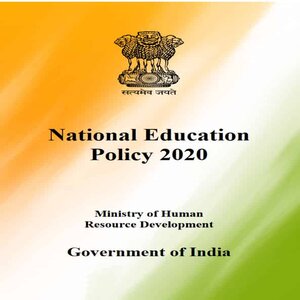How Education Will Change with NEP 2020
 The Indian Education system has often been subjected to a lot of questions due to its unnecessary focus on various kinds of outdated assessments and examinations causing hindrance to the learning curve of the students. The biggest irony in the present scenario is that even after securing more than 90 percent marks, there is no guarantee of decent jobs for the students. For the past 34 years, Indian education has solely been a mark-based domain where success is measured in terms of theory-based knowledge. Most of the students are not equipped with any industry-relevant skills even after acquiring their degrees which has also resulted in the enhancement of the unemployment rate in the country.
The Indian Education system has often been subjected to a lot of questions due to its unnecessary focus on various kinds of outdated assessments and examinations causing hindrance to the learning curve of the students. The biggest irony in the present scenario is that even after securing more than 90 percent marks, there is no guarantee of decent jobs for the students. For the past 34 years, Indian education has solely been a mark-based domain where success is measured in terms of theory-based knowledge. Most of the students are not equipped with any industry-relevant skills even after acquiring their degrees which has also resulted in the enhancement of the unemployment rate in the country.
Replacing the existing National Policy on Education which was initially articulated in 1986 and last modified in 1992, The novel National Education Policy (NEP) 2020 is all set to renovate the educational domain of the country by integrating both school and college education into a more extensive, flexible, and multidisciplinary unit. Appropriate to the needs of the 21st century the National Education Policy (NEP) 2020 aims to bring out the novel capabilities of every student.
With guaranteed Universal Access at All Levels of schooling from pre-primary school to 12th standard, NEP 2020 intends to accomplish a complete Gross Enrolment Ratio in school education by 2030. Guaranteeing early childhood care and education for all kids between 3-6 years by 2025, the NEP 2020 promotes kids in the ages of 3-5 by catering to the flow arrangement of anganwadis and pre-schools, and including the schooling framework in a consistent integrated way.
Emphasizing the early Childhood Care and Education, the earlier 10+2 format of the school educational curriculum is to be substituted by a 5+3+3+4 curricular construction corresponding to ages 3-8, 8-11, 11-14, and 14-18 years separately.
The new framework will include 12 years of schooling with three years of Anganwadi/pre-schooling. Covering four phases the NEP will have a Foundational Stage (3 years of Anganwadi along with class 1 and class 2, covering the age of 3-8), Preparatory Stage (Between class 3 to class 5, covering ages 8-11), Middle Stage (Between Class 6 to class 8, covering ages 11-14), and Secondary Stage (Between class 9-12 in two stages, 9 and 10 in the first phase and 11 and 12 in the second phase, covering between the age group 14-18).
Students will have amplified the flexibility and selection of subjects with the goal that they select their own subjects according to their gifts and interests. There will be no stiff exclusion between arts or science streams, curricular and extra-curricular exercises, or vocational and academic streams. The objective is to ensure equal prominence on all subjects such as science, sociologies, craftsmanship, languages, sports, arithmetic – with the integration of vocational and academic streams in school.
The NEP intends to increase the GER in higher education to half by 2035 also including vocational education from 26.3% (2018) to half by 2035. The multi-disciplinary all-inclusive education at the undergraduate level ensures integrated, complete introduction to science, expressions, humanities, arithmetic and professional fields with imaginative and flexible curricular structures, inventive combinations of study, integration of vocational education and various passage/leave points.

